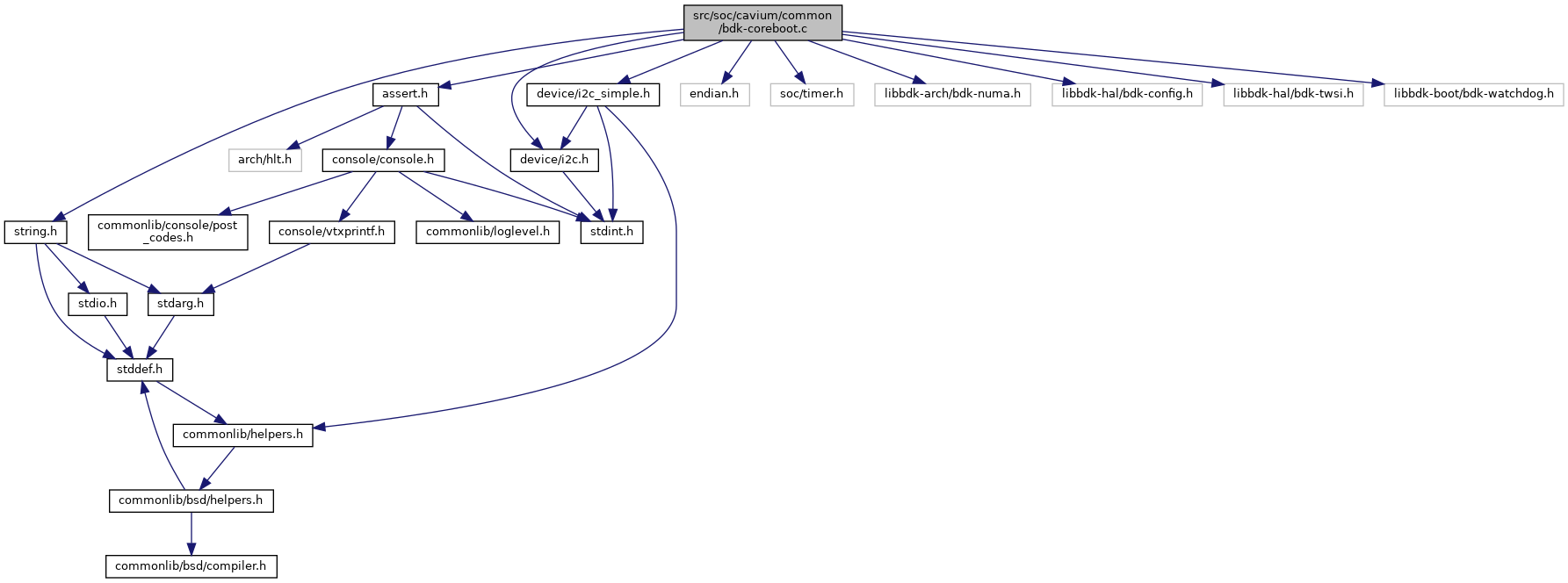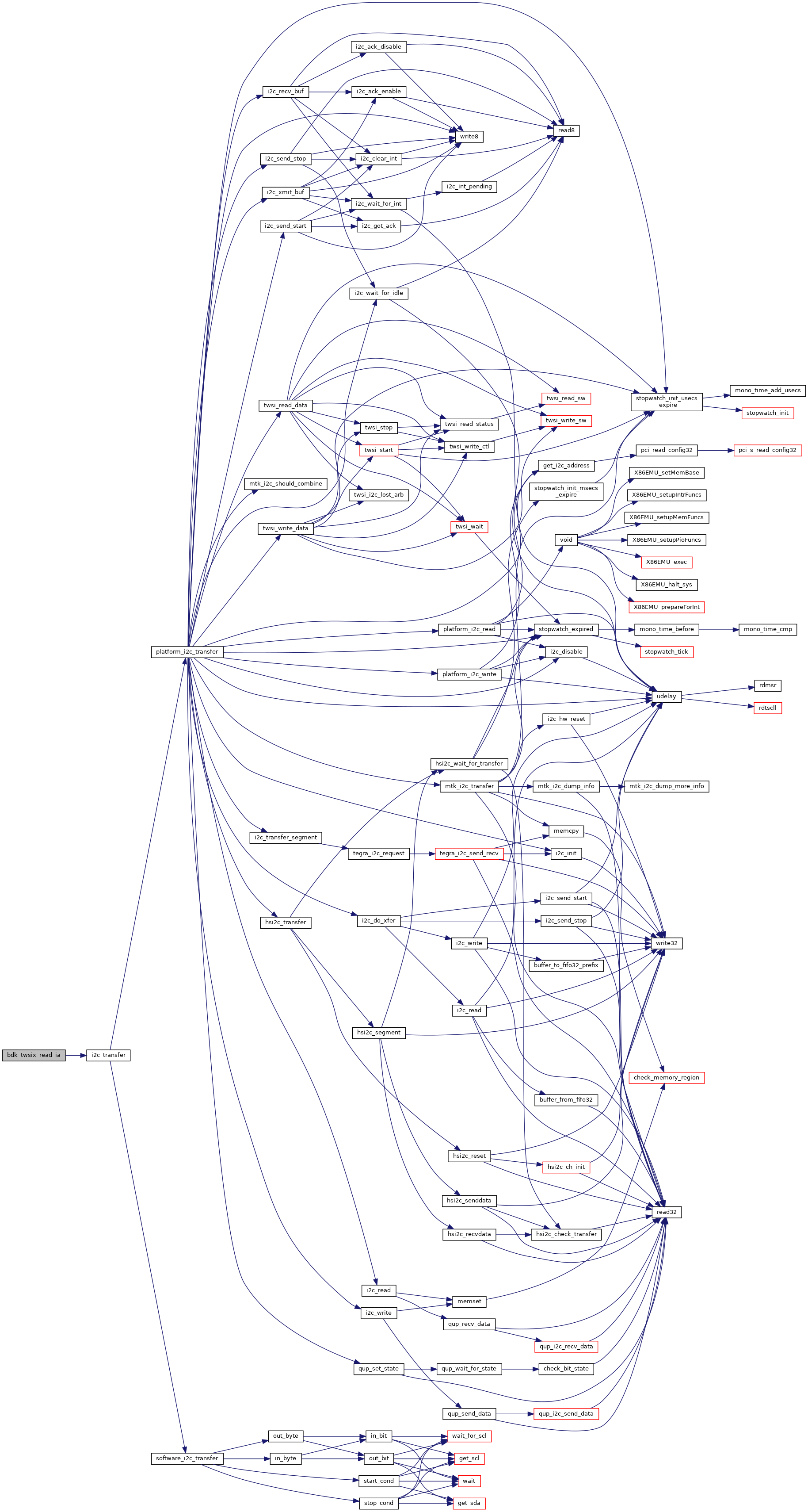 |
coreboot
coreboot is an Open Source project aimed at replacing the proprietary BIOS found in most computers.
|
 |
coreboot
coreboot is an Open Source project aimed at replacing the proprietary BIOS found in most computers.
|
#include <string.h>#include <assert.h>#include <device/i2c.h>#include <device/i2c_simple.h>#include <endian.h>#include <soc/timer.h>#include <libbdk-arch/bdk-numa.h>#include <libbdk-hal/bdk-config.h>#include <libbdk-hal/bdk-twsi.h>#include <libbdk-boot/bdk-watchdog.h>
Go to the source code of this file.
Functions | |
| int64_t | bdk_twsix_read_ia (bdk_node_t node, int twsi_id, uint8_t dev_addr, uint16_t internal_addr, int num_bytes, int ia_width_bytes) |
| Do a twsi read from a 7 bit device address using an (optional) internal address. More... | |
| int | bdk_twsix_write_ia (bdk_node_t node, int twsi_id, uint8_t dev_addr, uint16_t internal_addr, int num_bytes, int ia_width_bytes, uint64_t data) |
| Write 1-8 bytes to a TWSI device using an internal address. More... | |
| void | bdk_watchdog_set (unsigned int timeout_ms) |
| void | bdk_watchdog_poke (void) |
| void | bdk_watchdog_disable (void) |
| int | bdk_watchdog_is_running (void) |
| int64_t bdk_twsix_read_ia | ( | bdk_node_t | node, |
| int | twsi_id, | ||
| uint8_t | dev_addr, | ||
| uint16_t | internal_addr, | ||
| int | num_bytes, | ||
| int | ia_width_bytes | ||
| ) |
Do a twsi read from a 7 bit device address using an (optional) internal address.
Up to 4 bytes can be read at a time.
| twsi_id | which TWSI bus to use |
| dev_addr | Device address (7 bit) |
| internal_addr | Internal address. Can be 0, 1 or 2 bytes in width |
| num_bytes | Number of data bytes to read (1-4) |
| ia_width_bytes | Internal address size in bytes (0, 1, or 2) |
Definition at line 35 of file bdk-coreboot.c.
References ARRAY_SIZE, assert, i2c_msg::buf, buf, i2c_msg::flags, I2C_M_RD, i2c_transfer(), i2c_msg::len, and i2c_msg::slave.

| int bdk_twsix_write_ia | ( | bdk_node_t | node, |
| int | twsi_id, | ||
| uint8_t | dev_addr, | ||
| uint16_t | internal_addr, | ||
| int | num_bytes, | ||
| int | ia_width_bytes, | ||
| uint64_t | data | ||
| ) |
Write 1-8 bytes to a TWSI device using an internal address.
| twsi_id | which TWSI interface to use |
| dev_addr | TWSI device address (7 bit only) |
| internal_addr | TWSI internal address (0, 8, or 16 bits) |
| num_bytes | Number of bytes to write (1-8) |
| ia_width_bytes | internal address width, in bytes (0, 1, 2) |
| data | Data to write. Data is written MSB first on the twsi bus, and only the lower num_bytes bytes of the argument are valid. If a 2 byte write is done, only the low 2 bytes of the argument is used. |
Definition at line 77 of file bdk-coreboot.c.
References assert, i2c_msg::buf, buf, i2c_msg::flags, i2c_msg::len, memcpy(), platform_i2c_transfer(), and i2c_msg::slave.
Referenced by mainboard_enable().


Definition at line 108 of file bdk-coreboot.c.
References watchdog_disable().

| int bdk_watchdog_is_running | ( | void | ) |
Definition at line 113 of file bdk-coreboot.c.
References watchdog_is_running().

Definition at line 103 of file bdk-coreboot.c.
References watchdog_poke().

Definition at line 98 of file bdk-coreboot.c.
References watchdog_set().
